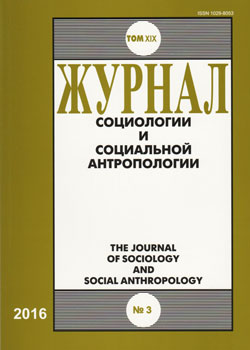Death Studies in Social and Historical Anthropology: the Genesis of Ideas
Keywords:
death studies, anthropology of death, death and dying
Abstract
In Russian-speaking humanities death, as a research problem, exists only in philosophical and literary works. The reason for this disciplinary bias lies in strong national philosophical school starting from N. Berdyaev and N. Fedorov and up to Russian school of thanatology in 1990s. Death studies with sociological and anthropological focus are conducted only in strict empirical way avoiding serious theorizing. Many of the classical anthropological approaches are unknown to Russian readers, e.g. Robert Hertz’s legacy. This situation makes reviewing death studies an urgent task. This article is an attempt to consider the genesis of death studies. The author describes the key trends and theoretical problems from the early evolutionists to methodological crisis of the 1960s. The author consistently examines the early death studies by J. Lubbock, J.F. MacLennan, L.H. Morgan, as well as E. Taylor and J. Fraser. The author proceeds with three key approaches: the French sociological school (E. Durkheim, R. Hertz, M. Mauss); British functionalism (B. Malinowski and A. Radcliffe-Brown) and the theory of «rites of passage» (A. van Gennep). The methodological crisis that emerged from the transition of the death studies in traditional communities to modern societies is examined in the key articles of J. Fabian and R. Rosaldo. In conclusion, the author puts forward the assumption of a significant role of historical anthropology in resolving this crisis.
Published
2016-05-20
How to Cite
Mokhov, S. (2016). Death Studies in Social and Historical Anthropology: the Genesis of Ideas . ZHURNAL SOTSIOLOGII I SOTSIALNOY ANTROPOLOGII (The Journal of Sociology and Social Anthropology), 19(3), 171–188. Retrieved from http://jourssa.ru/jourssa/article/view/524
Section
Social Anthropology

